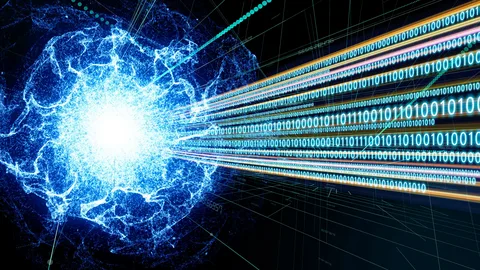Imagine a world where information could be transmitted instantaneously, and communication was so secure that even the most advanced hackers couldn’t breach it. Welcome to the era of the Quantum Internet, where the revolutionary concept of Quantum Key Distribution (QKD) plays a pivotal role in ensuring unprecedented security.
Understanding Quantum Key Distribution (QKD)
To comprehend the essence of QKD, let’s delve into the basics of quantum mechanics. At the heart of quantum communication are qubits, the quantum counterparts of classical bits. Unlike classical bits, qubits can exist in multiple states simultaneously, thanks to the principles of superposition and entanglement.
How QKD Differs from Classical Key Distribution
Traditional cryptographic methods have their limitations. Enter QKD, offering a quantum leap in security. The superposition and entanglement properties of qubits make it virtually impossible for eavesdroppers to intercept information without detection.
The Quantum Internet Infrastructure
Quantum nodes, essential components of the Quantum Internet, perform intricate tasks using the principles of quantum mechanics. Quantum entanglement serves as the cornerstone for establishing secure communication channels.
Quantum Key Distribution Protocols
Two primary protocols, BBM92 and E91, facilitate secure key distribution without the risk of interception. Understanding these protocols is crucial for grasping the robust security offered by QKD.
Real-world Applications of QKD
From quantum communication networks to securing financial transactions and sensitive data, the applications of QKD are vast and transformative. The Quantum Internet is not a distant dream but a tangible reality reshaping our digital landscape.
Challenges and Future Developments
Despite its promises, QKD faces challenges. Ongoing research aims to overcome current limitations, paving the way for a more secure and efficient Quantum Internet.
Quantum Internet vs Traditional Internet
Comparing the Quantum Internet with its traditional counterpart reveals significant differences in speed and security. The implications for future technologies are profound, promising a new era of digital communication.
Public Perception and Misconceptions
Dispelling common myths surrounding quantum technology is crucial to gaining public trust. Understanding the fundamentals of quantum mechanics helps bridge the gap between perception and reality.
Quantum Internet and Global Security
QKD’s role in national and international security is paramount. The potential impact on diplomatic communications introduces a new dimension to global security.
Quantum Computing and Its Relation to the Quantum Internet
Quantum computers, while distinct from the Quantum Internet, share a symbiotic relationship. Exploring this synergy reveals exciting possibilities for future advancements.
The Race for Quantum Supremacy
Nations and companies worldwide are in a race for quantum supremacy. Understanding the current state of research and development is key to navigating this competitive landscape.
Accessibility and Integration Challenges
Making quantum technology accessible to businesses and overcoming integration challenges are crucial steps toward widespread adoption.
Educational Initiatives in Quantum Technology
Educating the public on quantum concepts is vital for fostering understanding and trust. Various training programs and resources are available to bridge the knowledge gap.
Conclusion
In conclusion, Quantum Key Distribution is not just a technological advancement; it’s a paradigm shift in how we perceive and secure digital communication. The Quantum Internet is on the horizon, promising a future where security and speed coexist seamlessly.
Frequently Asked Questions
- Is the Quantum Internet a reality, or is it still in the experimental stage?
- The Quantum Internet is actively being developed, with some experimental implementations already showcasing its potential.
- How does Quantum Key Distribution differ from traditional encryption methods?
- Unlike traditional encryption, QKD relies on the principles of quantum mechanics, providing an unparalleled level of security.
- What challenges does the Quantum Internet face in terms of global adoption?
- Challenges include infrastructure development, accessibility, and addressing public misconceptions about quantum technology.
- Can individuals benefit from the Quantum Internet, or is it primarily for governments and large organizations?
- While governments and large organizations are at the forefront, efforts are underway to make quantum technology accessible to individuals and small businesses.
- How can one stay informed about the latest developments in quantum technology and the Quantum Internet?
- Following reputable scientific journals, attending conferences, and participating in online communities dedicated to quantum technology are excellent ways to stay informed.



